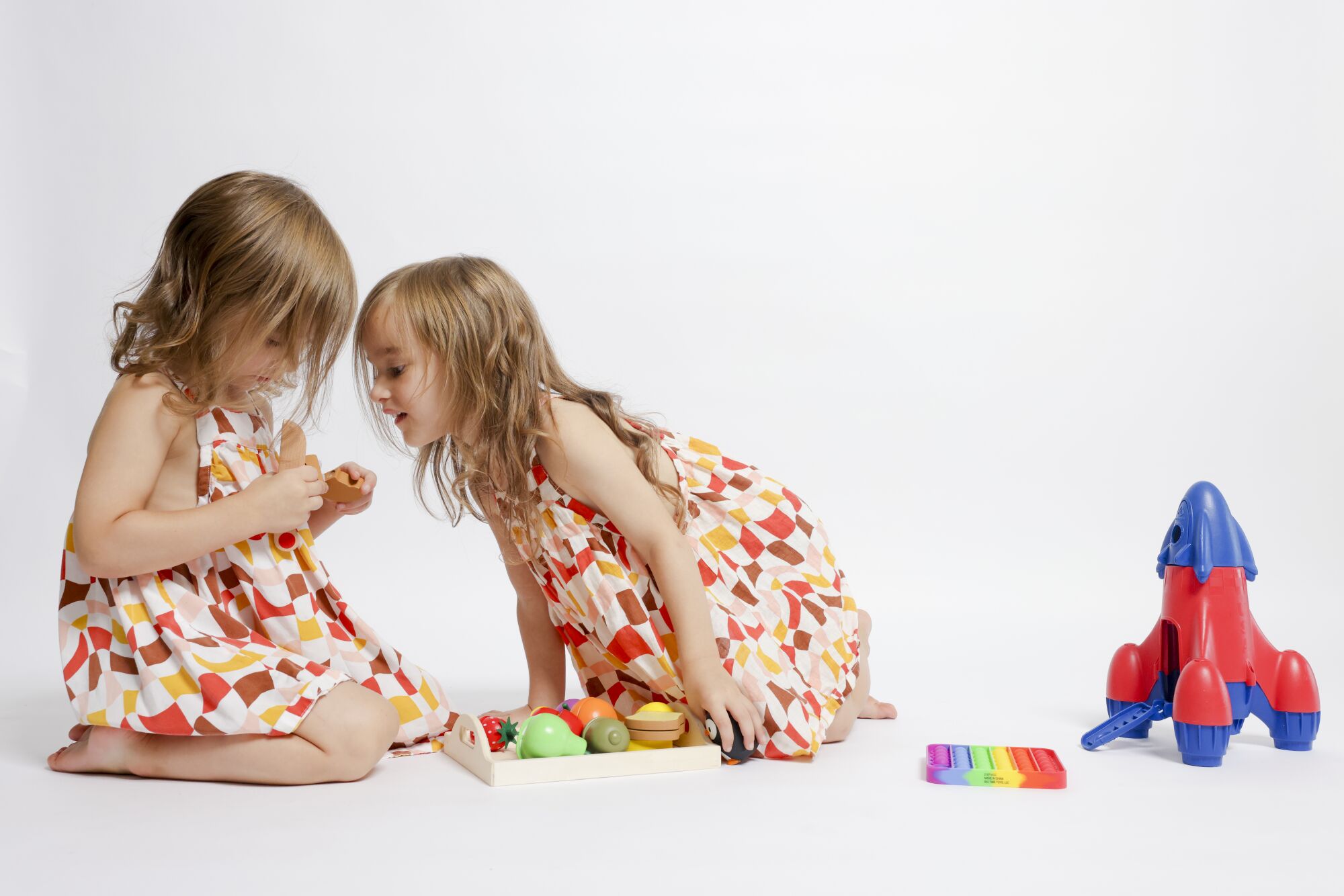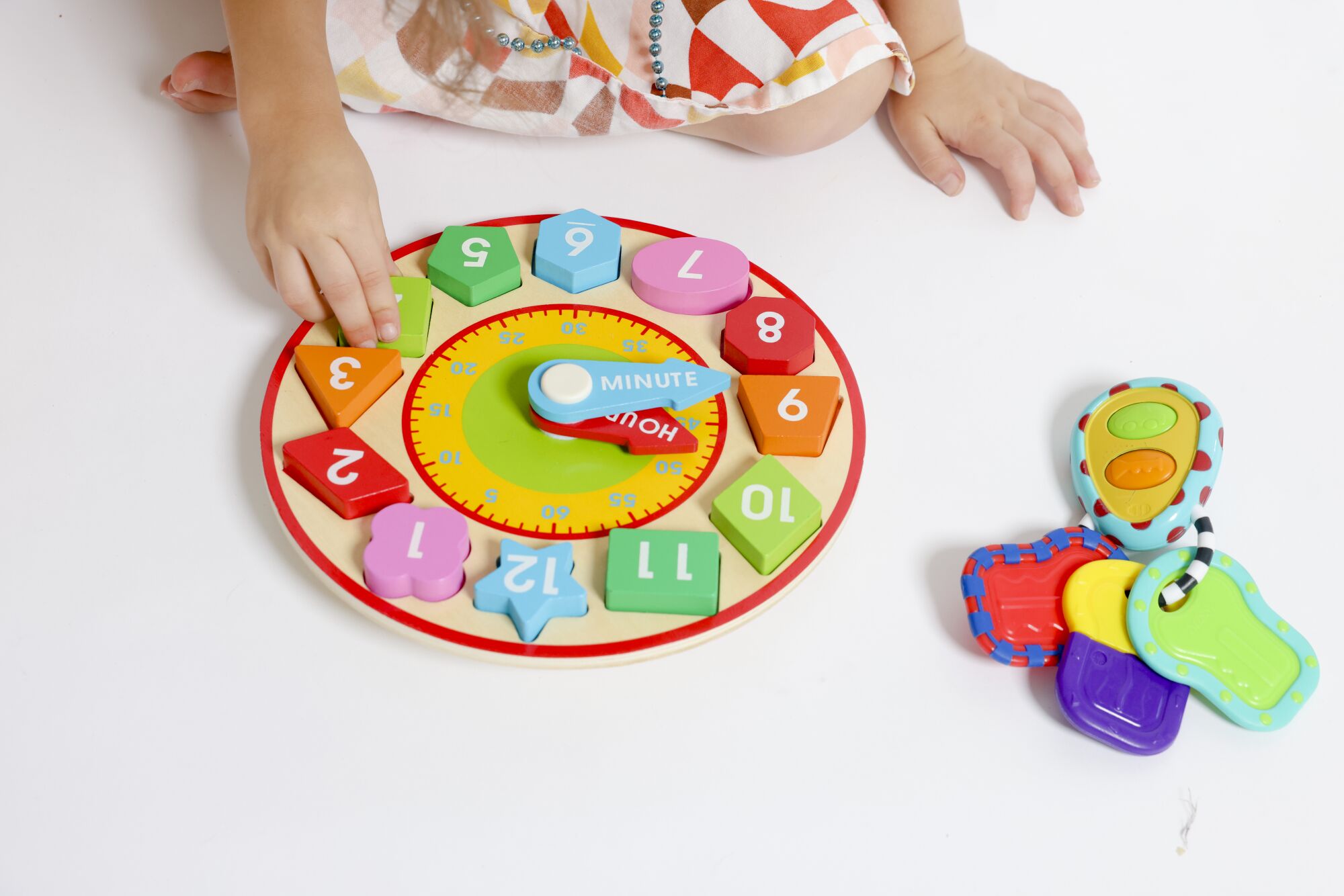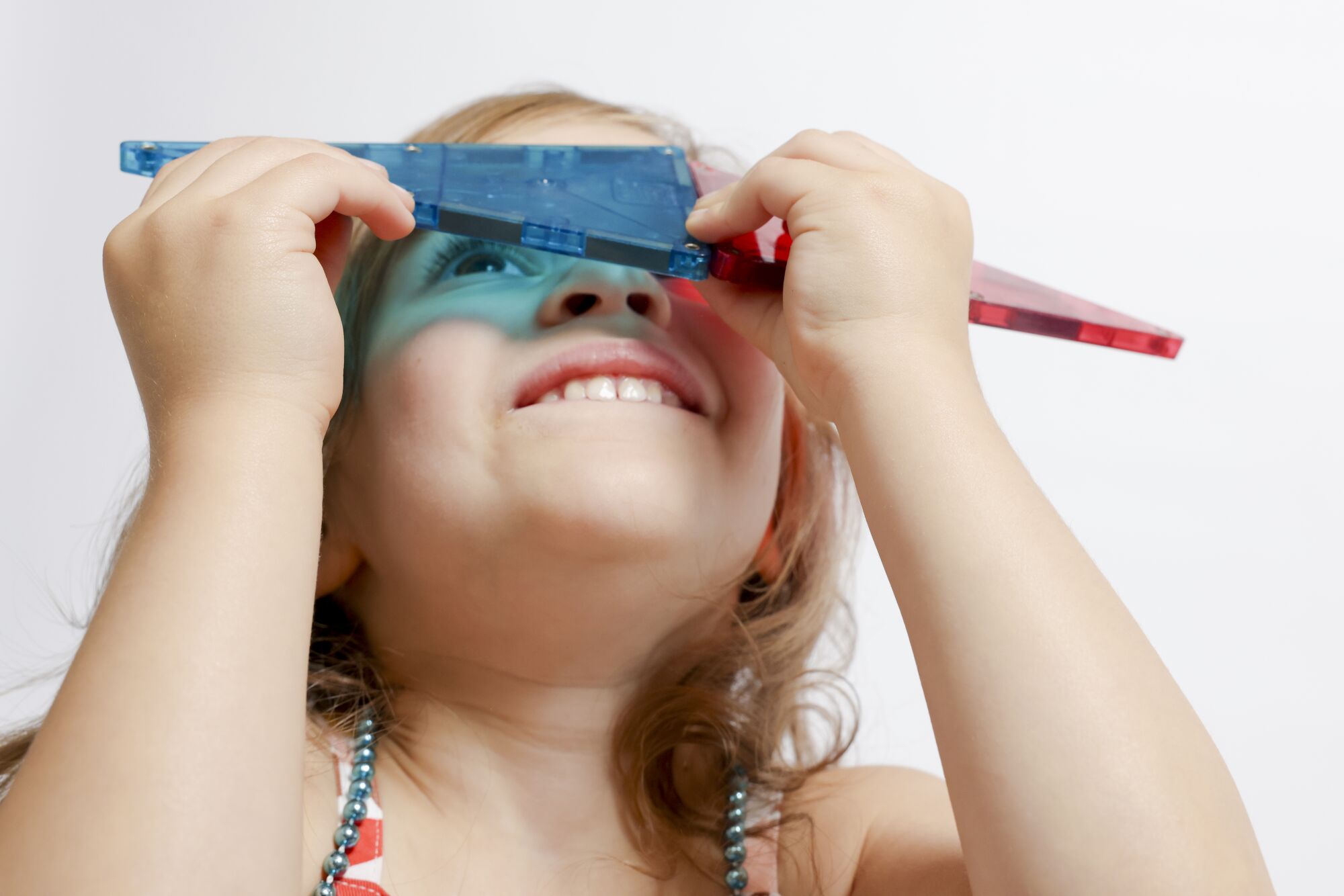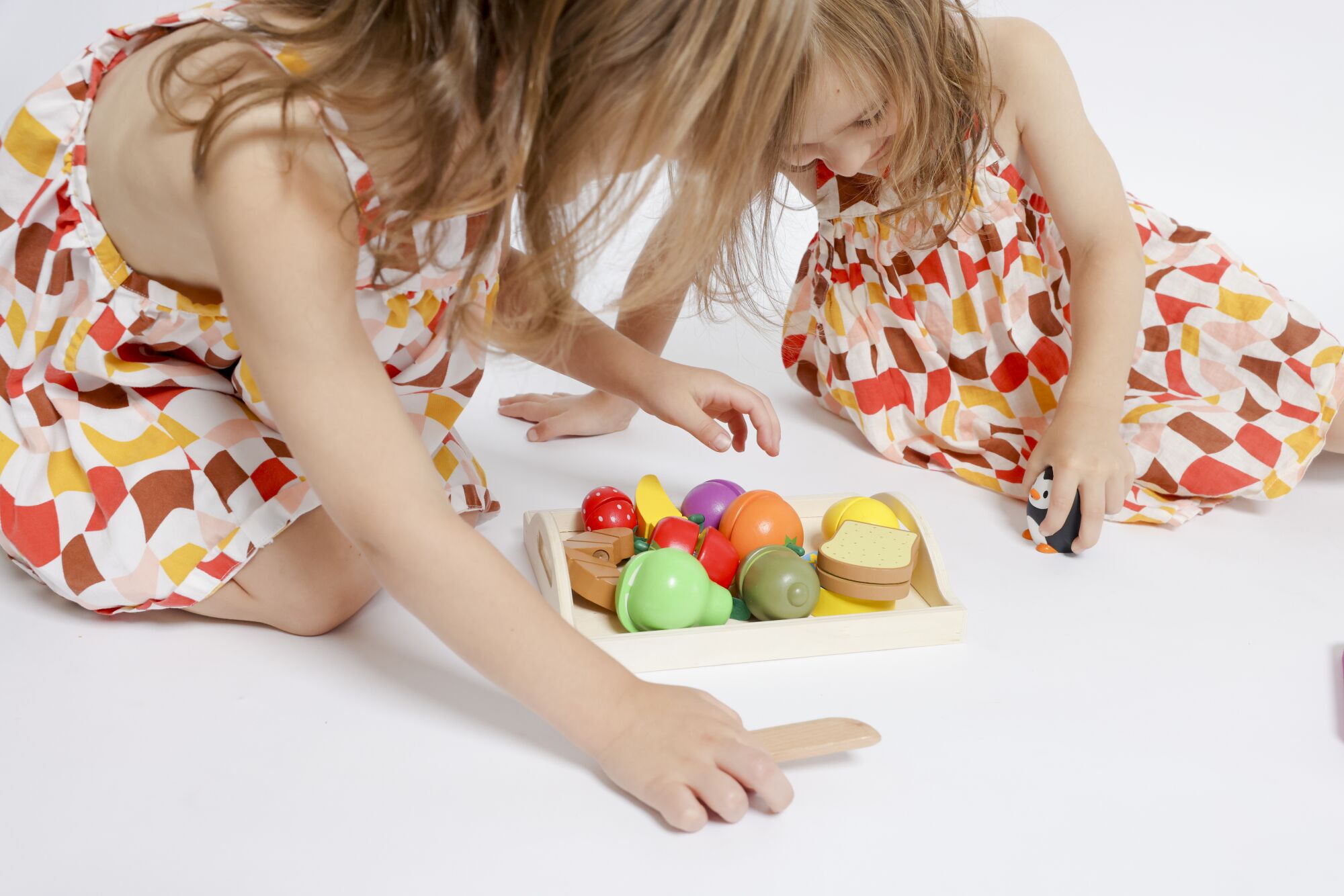[ad_1]
When Jess Castaneda was a kid, she got her toys when her abuela took her to garage sales. It turned her into a lifetime thrift shopper. As an adult, she became a customer at the Green Bean, a kids resale shop in Eagle Rock — before she took it over in 2018.
Castaneda took over the Green Bean — which offers used toys that have been inspected and approved by staff, as well as a small selection of new eco-friendly toys and gifts — shortly after becoming a parent. She’d been thinking about the habits and attitudes she wanted to pass on to her children. It was important that her kids learned to be environmentally conscious and to regard secondhand goods as normal and valuable.
Of course, for many parents of young children, being eco-friendly can’t compete with the deluge of more urgent responsibilities. This is understandable and natural, experts on eco-friendly toys say, and they urge overwhelmed parents to be patient with themselves if they find their homes littered with plastic toys.

Joanne O’Donoghue, of eco-friendly toy company Petit Collage, recommends two quick checks on toys: Are the wood and paper certified by an organization you trust? Does it have recycled content?
(Dania Maxwell / Los Angeles Times)
But parents can take small steps that make a difference.
Need some guidance? Castaneda; Jackie Breyer, vice president of Adventure Media & Events, which publishes Toy Insider; Joanne O’Donoghue, the head of brand and production of eco-friendly toy company Petit Collage; and Brad Kahn, communications director at the Forest Stewardship Council, a nongovernmental organization promoting forest management, have some tips for how parents can think green when they’re looking for toys for their kids.
Learn the basics
Interest in well-crafted toys — many of them made from wood — is on the rise among millennial parents. For those who are beginning to learn about eco-friendly toy options, O’Donoghue recommends two quick checks:
Are the wood and paper certified by an organization you trust?
Does it have recycled content?
Kahn said toys are typically made using three materials — wood, plastic and metal. Wood is the only one that’s renewable. The Forest Stewardship Council, he added, sets high standards for what it means to manage forests responsibly. An “FSC 100%” label, Kahn said, means that all materials come from responsibly managed, FSC-certified forests.
Understand how the toy industry has evolved
When Breyer started covering the toy industry two decades ago, she wrote about “green toys” — what eco-friendly toys were called at the time — and there were very few companies producing them.
“Back then, toys that were designed to be eco-friendly were a lot more expensive, and they had more trouble selling them,” she said.

Experts on eco-friendly toys urge parents to be patient with themselves if they find their homes littered with plastic toys.
(Dania Maxwell / Los Angeles Times)
Now they’re easier to find. Toy Insider, which reviews thousands of toys year-round to compile guides, regularly lists their top eco-friendly toys on Earth Day. For companies like Melissa & Doug, producing sustainably made toys is one of their selling points.
Also, in recent years, more big toy companies — Hasbro, Mattel, Lego, Playmobil and MGA — have all made environmental commitments, stressing sustainability. (In December 2019, for example, Mattel announced its goal to “achieve 100 percent recycled, recyclable or bio-based materials” in both its products and packaging by 2030.)
“Lots of toy brands are now using FSC-certified materials, which wouldn’t have been the case 10 years ago,” O’Donoghue said. Most companies have also converted to using vegetable- and soy-based inks, instead of oil-based ones, she added.
“If a huge company that makes billions of toys takes steps to be more carbon-neutral, sustainable or eco-friendly, it makes a huge impact,” Breyer said. “Even small changes are better than no change.”
Buy less; keep longer
“Plastic isn’t always bad, and wood isn’t always good,” O’Donoghue said. “We don’t use plastic at Petit Collage as a choice, but buying a high-quality plastic toy that is designed to last and be passed on for generations is better than buying a cheap wooden toy that is non-FSC and finds itself in the bin within a year.”
Castaneda gives similar advice to her customers on a budget. It’s better to buy three toys that will last than to spend the same amount of money on seven toys of lesser quality, she said.
And even if you can’t pass the toy on to younger siblings, cousins and friends’ kids, you can go to a store like the Green Bean and resell it, she said.
“I’ve had toys come into the store and cycle through three or four times,” she said. “Because these are good [quality] toys.”

In recent years, more big toy companies — Hasbro, Mattel, Lego, Playmobil and MGA — have made environmental commitments, stressing sustainability.
(Dania Maxwell / Los Angeles Times)
Where to shop
Resale stores that focus on children and toys
Kid to Kid, Pasadena
Grow Kid Grow, Silverlake
The Green Bean, Eagle Rock
Noodles Kid’s Resale Boutique, Culver City
Children Charities Resale, West L.A.
Wear it Once Wear it Twice, Burbank
Kids Double Time, Redondo Beach
Los Alamitos Kids Resale, Los Alamitos
Dakota + Rowan, Sierra Madre
Children’s Orchard, which has locations in Cypress, Laguna Niguel, Lake Forest, Manhattan Beach, San Dimas and Santa Clarita
There are also online community groups including Buy Nothing that help parents find reused goods from their neighbors.
Check the packaging
Companies can make changes by reducing the amount of packaging and changing the materials used for it.
Breyer said many toy companies are figuring out how to make the packaging a part of the toy itself — say, a box that could be repurposed into another toy. “When the packaging is the storage material, it makes a big difference, especially if it’s eco-friendly on top of that,” she said.
Choose paperback books
Paperback books can be recycled, but hardback ones can’t because they have lamination, a thin layer of plastic on top of the covers.
Paperback books often use varnish instead of lamination to create a glossy effect, and Petit Collage has been experimenting with stickers made with varnish instead of lamination, O’Donoghue said.
A quick way to see whether something is laminated or varnished is to tear it, she explained. If it rips, it can be recycled. If it has lamination, you’ll find resistance from that thin layer of plastic that can’t be torn.
“Lego came up with this varnish that you can use on rigid boxes,” she said, adding that the company shared the new technology so other toy makers could also use it. “You couldn’t create a rigid box before without a laminate because it would damage. And now there’s a varnish in the market that you can use, and it’s absolutely brilliant.”

Some toys can teach kids about recycling, being mindful or protecting the planet.
(Dania Maxwell / Los Angeles Times)
Teach eco-habits through play
There are toys that teach kids how to take care of the environment.
For example, Green Toys sells a recycling truck. Melissa & Doug has a vegetable gardening play set. Petit Collage has Rush to Recycle, a sorting game that introduces youngsters to the idea of recycling. And Hape has a line of “Green Planet Explorer” products that teach them about protecting the planet.

If the Golden State is going to lead the world toward a better, safer future, our political and business leaders — and the rest of us — will have to work harder to rewrite the California narrative. Here’s how we can push the state forward.
[ad_2]
Source link